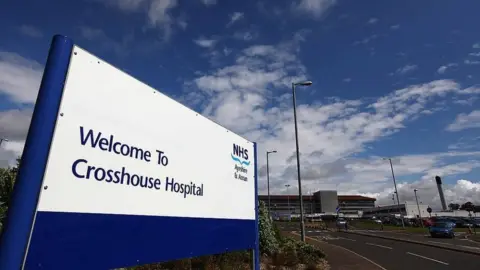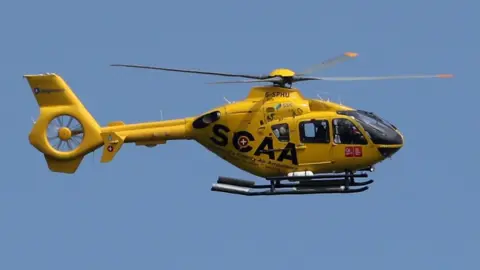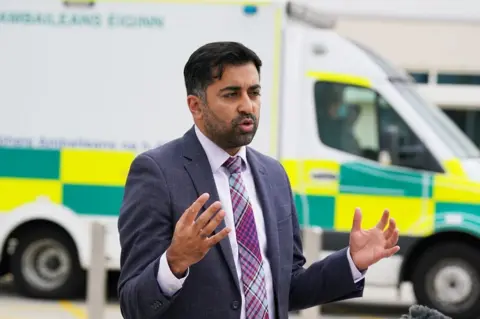No ambulance to meet helicopter patient at hospital
 Getty Images
Getty ImagesA patient was airlifted to Glasgow Airport as no ambulances were available for a 300 yard transfer from the helipad at an East Ayrshire hospital.
The individual, who was picked up by an air ambulance on Arran, was then driven 26 miles from the airport back to Crosshouse Hospital, near Kilmarnock.
Both the Scottish Ambulance Service and Scottish government have apologised for the delay.
A Tory MSP said the patient's experience was "truly terrifying".
Details of the case, first reported by LBC, emerged amid mounting winter pressures on the NHS.
This has resulted in an appeal by NHS Greater Glasgow & Clyde for patients only to turn up at A&E if their situation is urgent or life-threatening.
And on Wednesday NHS Lothian confirmed relatives of some hospital patients are to be asked to provide care for their loved ones at home in a bid to free up beds.
 PA Media
PA MediaIn the latest example of the strain on the system it has emerged a patient was airlifted to Crosshouse earlier this month having taken unwell on the Isle of Arran.
But after the helicopter landed it became clear there were no ambulances available to complete the short journey from the helipad to the hospital.
Instead they were flown about 25 miles to Glasgow Airport where they they met an ambulance crew who drove them back to Kilmarnock.
'Extended hospital turnaround times'
A Scottish Ambulance Service spokesman said: "Whilst we are limited in what we can say due to patient confidentiality, we can confirm we transported a patient from Arran to Crosshouse Hospital via air ambulance on Thursday 8 December 2022.
"Unfortunately, extended hospital turnaround times at Crosshouse Hospital at that time meant a delay to the ambulance and therefore the aircraft had to divert to Glasgow Airport to avoid icing in the bad weather.
"We apologise for any distress caused."
 PA Media
PA MediaA Scottish government spokeswoman said: "We are aware of this incident and understand that the ambulance service are looking into the circumstances.
"We expect steps to be taken to ensure incidents of this kind do not occur again, and we apologise to this patient for their experience and hope they are recovering well."
Claire Burden, chief executive of NHS Ayrshire & Arran, said its hospitals were experiencing "extremely high demand" for unscheduled care services.
She apologised for the longer waiting times experienced by some patients, and said they were working with the Scottish Ambulance Service to reduce avoidable waits.
'Total chaos'
Scottish Conservative health spokesman Dr Sandesh Gulhane said the story was a damning indictment of the current state of the health service.
He added: "This will have been a truly terrifying situation for this patient and my thoughts are with them.
"It lays bare the total chaos that Humza Yousaf is presiding over in our NHS, despite the best efforts of dedicated ambulance crews.
"Going back and forth between different health boards, having already been in an air ambulance, will have caused huge distress and anxiety for this suffering patient."
Dr Gulhane also called for the patient to be given an "urgent apology" after a chain of events he described as "utterly shameful".
Waiting times
Meanwhile, on Tuesday it emerged more than a third of people attending at A&E departments were not seen within the Scottish government's four-hour target in the first full week of December.
Data from Public Health Scotland (PHS) showed that in the week to 11 December, 62.4% of people were seen and subsequently admitted, transferred or discharged within the target time.
The Scottish government aims to have 95% of people seen within the four-hour target.
But last month the country's hospitals recorded their worst ever accident and emergency waiting times.
In a separate development, NHS Lothian bosses are urging anyone asked to provide care for a relative on an interim basis while waiting for a package of social care to be put in place to "give the request some serious consideration".
The board's chief executive Calum Campbell said the move comes as the health service comes under "unprecedented" and "sustained" pressure.
It comes at a time when the NHS is dealing with large numbers of emergency patients, at the same time as medics are seeing an increase in respiratory illness.
Delayed discharge, where patients are medically well enough to leave hospital but have to stay while they wait for care arrangements to be put in place, is also increasing pressure on the service, the health board said.
